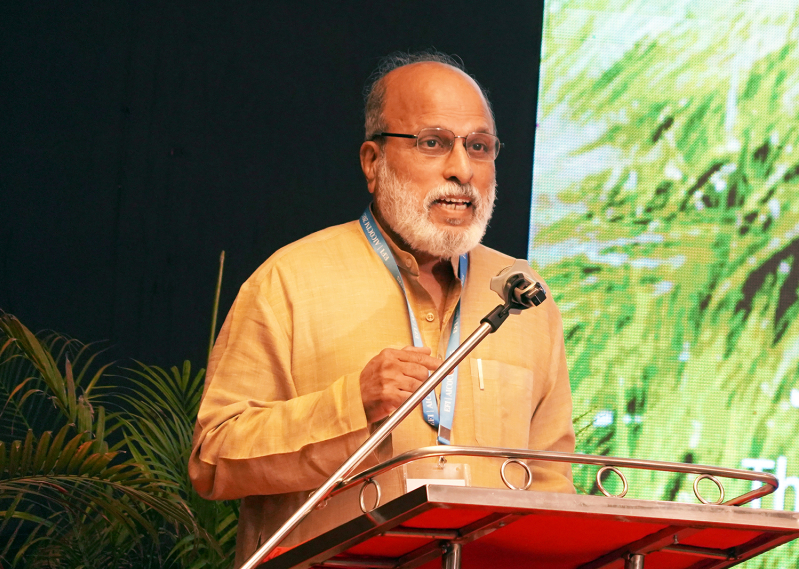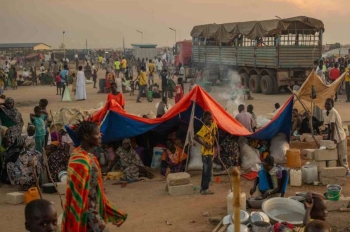
The second day of the All India Congress on Church in Mission (AICOCIM) featured a deeply reflective plenary address by Rev. Dr. Jayakumar Christian, former CEO of World Vision India and past lead for Faith & Development at World Vision International, who urged the Indian Church to recognize its calling to live and serve from the margins of society.
Christian argued that being located in the margins is not an accident of history but a deliberate design of Christian faith, pointing out that throughout history, movements that transformed societies were birthed among those with little political or economic power. He urged delegates to resist playing the victim when marginalized, instead discerning “the fingerprints of God” in those circumstances.
Church in the margins as part of God’s design
Christian emphasized that Christianity itself is rooted in powerlessness and surrender. “Our faith chooses powerlessness over power,” he said, noting that Jesus’ decision to suffer and die exemplifies this radical redefinition of power. The Church, therefore, must not view marginalization as a curse but as an opportunity to embody the way of Christ.
“Movements are always birthed in the margins,” Christian told the audience. “When the Church becomes obsessed with constructing monuments and competing for power, it loses its distinctiveness. But when it embraces its place in the margins, it has the capacity to spark movements that transform entire nations.”
Drawing from missiologist David Bosch, Christian underlined that mission can only be realized when the Church is willing to choose intentional powerlessness. “If we play power games, our witness will be no different from the world around us,” he warned. “But if we live faithfully in weakness, God’s power is revealed.”
Christian insisted that the Church should not define itself as serving those “among” the margins in a paternalistic way, but rather as being fully in the margins. This distinction, he said, reflects a theology that sees God working not only for the poor but with and through them.
“The Church does not exist simply to provide projects and services for the poor,” he said. “Our calling is to live in solidarity, to transform the whole nation from the margins. If our faith makes sense to the weakest link in the chain, then it will make sense to all of India.”
He pointed out that the credibility of the gospel depends on its relevance to people who live in fear or feel like second-class citizens. “When we are relevant to the pain and grief of our nation, the gospel becomes relevant,” Christian said. “If we are not, India will say the gospel is irrelevant.”
Redefining power and articulating God’s mind
According to Christian, the Church’s location in the margins is meant to redefine power. Instead of controlling or dominating, the Church is called to demonstrate that true power is found in surrender, humility, and sacrificial love.
“Our task is to articulate the mind of God from the margins,” he said. “India wants to know: what does the Christian God think about the abuse of children, the crushing of dreams, the fear that grips so many? The Church must be the voice that reveals God’s heart for the broken.”
Christian recounted experiences from his years of ministry with World Vision, describing encounters with children whose circumstances epitomized marginalization. One mother told him she “could not afford to dream” for her brilliant young daughter because the girl was HIV positive and could not access proper pediatric treatment. For Christian, this encapsulated what it means to live in the margins: “where dreams are crushed.”
“When the Church enters that space,” he said, “its responsibility is to affirm that every person is made in the image of God — and therefore has the right to dream.”
Five theological tasks for the Church in the margins
Christian proposed five areas of theological reflection that he said should guide the Church’s witness in India.
First, the Church must develop a theology of power that deliberately chooses powerlessness as the way to reflect the kingdom of God. “Marginalization and powerlessness are two sides of the same coin,” he explained. “Our faith compels us to redefine power, not to mimic the power games of society.”
Second, the Church must articulate a theology of identity, consistently affirming that every human being is made in the image of God. This conviction, unique to Christianity, carries profound implications for dignity, equality, and justice. “If 1.4 billion people in India discovered that truth,” Christian said, “our nation would be transformed.”
Third, the Church must cultivate a theology of anger — not destructive rage, but righteous indignation that refuses to remain silent when people made in God’s image are abused. He described his grief when working with children in Delhi slums, including cases of sexual violence. “If our hearts are not broken by what breaks the heart of God, nothing will be transformed,” he insisted.
Fourth, Christian called for a theology of the Holy Spirit that nurtures prophetic spirituality. He argued that strategies and programs are insufficient without the Spirit’s empowering presence. “Passion is contagious; strategy is not,” he said. “We need a Spirit-empowered church that can proclaim good news to the poor and confront spiritual strongholds.”
Finally, the Church must hold to a theology of truth, speaking clearly in public life when lies and distortions are institutionalized. “In the world, power precedes truth,” Christian said. “But in the kingdom of God, truth precedes power. The Church must never compromise on this.”
Passion that sparks movements
Christian repeatedly contrasted “movements” with “monuments,” urging the Church to recover its identity as a movement of transformation. Programs and institutions, while important, cannot reproduce life, he argued. Only passion embodied in people can ignite lasting change.
“The gospel will not advance because of our strategies, however modern or digital they may be,” he said. “It will advance when our lives, filled with the Spirit, reproduce life in others. Life reproduces life; programs never reproduce life.”
He added that passion must flow out of love for the marginalized and the conviction that God has not abandoned them. “The presence of the Church in the margins is the evidence that our God has not ignored the margins,” Christian said.
A challenge to integrity and credibility
Christian acknowledged that articulating these theologies requires credibility within the Church itself. He challenged leaders to examine their own practices of integrity and truth-telling, warning that hypocrisy undermines the witness of the gospel.
“Ordinary believers sitting in the pews are watching us,” he said. “They want to know: do we practice what we preach? Integrity is not optional. We owe it to our congregations to live out our theology before we articulate it.”
He concluded by referencing a hymn that speaks of facing uncertain days “because He lives.” Christian asked whether the millions on the margins in India can truly face uncertain days with hope because of the Church’s witness. “If not,” he said, “then we are offering them a bluff, not the gospel.”
Christian’s address resonated with the themes of AICOCIM, which has brought together more than four hundred leaders from across India to reflect on the future of the Church. His message challenged them to view marginalization not as a setback but as a divine opportunity.
“The Church belongs in the margins,” he concluded. “It is from the margins that God transforms the whole. When India sees that the gospel makes sense to the weakest, then it will know that our God is a living and loving God.”





